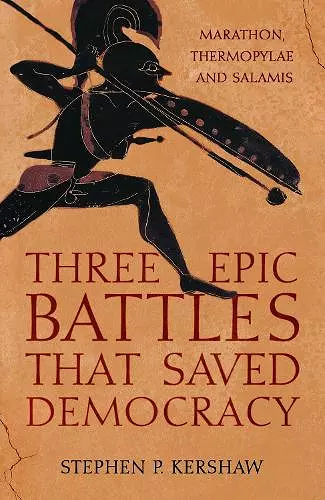Three Epic Battles that Saved Democracy
Marathon, Thermopylae and Salamis
Format:Paperback
Publisher:Little, Brown Book Group
Published:6th Apr '23
Should be back in stock very soon

Praise for the author's A Brief Guide to the Greek Myths: 'Eminently sane, highly informative'
PAUL CARTLEDGE, BBC History magazine
The year 2022 marks 2,500 years since the final defeat of the invasion of Greece by the Persian King Xerxes. This astonishing clash between East and West still has resonances in modern history, and has left us with tales of heroic resistance in the face of seemingly hopeless odds. Kershaw makes use of recent archaeological and geological discoveries in this thrilling and timely retelling of the story, originally told by Herodotus, the Father of History.
The protagonists are, in Europe, the Greeks, led on land by militaristic, oligarchic Sparta, and on sea by the newly democratic Athens; in Asia, the mighty Persian Empire - powerful, rich, cultured, ethnically diverse, ruled by mighty kings, and encompassing modern Iran, Iraq, Turkey, Syria and Egypt.
When the rich, sophisticated, Greek communities of Ionia on the western coast of modern Turkey, rebel from their Persian overlord Darius I, Athens sends ships to help them. Darius crushes the Greeks in a huge sea battle near Miletus, and then invades Greece. Standing alone against the powerful Persian army, the soldiers of Athens' newly democratic state - a system which they have invented - unexpectedly repel Darius's forces at Marathon.
After their victory, the Athenians strike a rich vein of silver in their state-owned mining district, and decide to spend the windfall on building a fleet of state-of-the-art warships.
Persia wants revenge. The next king, Xerxes, assembles a vast multinational force, constructs a bridge of boats across the Hellespont, digs a canal through the Mount Athos peninsula, and bears down on Greece. Trusting in their 'wooden walls', the Athenians station their ships at Artemisium, where they and the weather prevent the Persians landing forces in the rear of the land forces under the Spartan King Leonidas at the nearby pass of Thermopylae. Xerxes's assault is a disastrous failure, until a traitor shows him a mountain track that leads behind the Greeks. Leonidas dismisses the Greek troops, but remains in the pass with his 300 Spartan warriors where they are overwhelmed in an heroic last stand.
Athens is sacked by the Persians. Democracy is...
Praise for the author's A Brief Guide to the Greek Myths: Eminently sane, highly informative, and reasonably priced. -- Paul Cartledge * BBC History magazine *
Praise for the author's A Brief History of Atlantis: As his exhaustive survey shows, Atlantis has been adapted to countless ideologies and agendas over time, serving the needs of every sort of reader - 'harmless hippies or Heinrich Himmler' in Mr Kershaw's memorable phrase. -- James Romm * Wall Street Journal *
Praise for the author: The experts interviewed . . . [for the TV documentary series Barbarians Rising] are both entertaining and illuminating. -- Brian P. Kelly * Wall Street Journal *
Kershaw has written an impressive and timely book that reminds us that the principles of freedom and democracy are powerful motivators in war. -- Saul David * The Times *
One of the great virtues of Kershaw's book is the detailed knowledge he brings to bear on the war at sea. The description of the decisive naval battle of Salamis is superbly done. * Mail on Sunday *
ISBN: 9781472145659
Dimensions: 196mm x 126mm x 36mm
Weight: 378g
480 pages